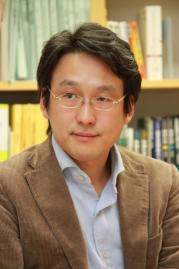
Dr. Hiroki R. Ueda was born in Fukuoka, Japan, in 1975. He graduated from the Faculty of Medicine, the University of Tokyo in 2000, and obtained his Ph.D in 2004 from the same university. He was appointed as a team leader in RIKEN Center for Developmental Biology (CDB) from 2003 and promoted to be a project leader at RIKEN CDB in 2009, and to be a group director at RIKEN Quantitative Biology Center (QBiC) in 2011. He became a professor of Graduate School of Medicine, the University of Tokyo in 2013. He is currently appointed as an team leader in RIKEN Center for Biosystems Dynamics Research (BDR), an affiliate professor in Graduate School of Information Science and Technology and an principle investigator in IRCN (International Research Center for Neurointelligence) in the University of Tokyo, an invited professor in Osaka University, and a visiting professor in Tokushima University.
He has an expertise in systems biology and focus on chronobiology by investigating mammalian circadian clocks and sleep/wake cycles. He determined a basic structure of a transcriptional circuit of mammalian circadian clocks and identified multiple delayed negative feedback motifs. He also focused on long-standing and unsolved questions in chronobiology and found that a singularity behavior (i.e. temporal stopping of circadian clocks) is caused by desynchronization of multiple cellular circadian oscillators, and that temperature-insensitive biochemical reactions underlie temperature compensation of mammalian circadian clocks. He also invented molecular-timetable methods to detect the circadian time of the body by measuring a snapshot information of circadian clocks. For sleep/wake cycles, he found that fast and slow Ca2+-dependent hyperpolarization pathways underlie sleep homeostasis, and proposed that their dysfunctions also underlie psychiatric, neuro-degenerative and neuro-developmental disorders. To accelerate these studies, he also invented whole-brain and whole-body clearing and imaging methods called CUBIC, as well as the next-generation mammalian genetics such as Triple-CRISPR, ES-mice and SSS methods for one-step production and analysis of KO and KI mice without crossing.
He received awards, including Tokyo Techno Forum 21, Gold Medal (Tokyo Techno Forum 21, 2005), Young Investigator Awards (MEXT, 2006) and IBM Science Award (IBM, 2009), a Young Investigator Promotion Awards (Japanese Society for Chronobiology, 2007). He also received Tsukahara Award (Brain Science Foundation, 2012), Japan Innovator Awards (Nikkei Business Publications Inc. 2004), Yamazaki-Teiichi Prize (Foundation for Promotion of Material Science and Technology of Japan, 2015), Innovator of the Year (2017) and The Ichimura Prize in Science for Excellent Achievement (Ichimura Foundation for New Technology, 2018).
